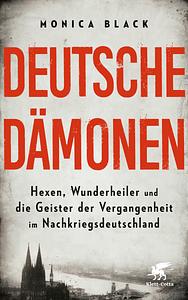Take a photo of a barcode or cover
45 reviews for:
Deutsche Dämonen: Hexen, Wunderheiler und die Geister der Vergangenheit im Nachkriegsdeutschland
Monica Black
45 reviews for:
Deutsche Dämonen: Hexen, Wunderheiler und die Geister der Vergangenheit im Nachkriegsdeutschland
Monica Black
Relatively interesting. Her writing style was not my favorite and I had to reread sentences and paragraphs a few times to make sense of what she was trying to say. Overall fun to delve into a part of history never really talked about.
This excellent study of belief in faith healing and witchcraft in the immediate post-WWII era in Germany is a fascinating read complete with intrigue, denazification, schemers, and thousands of people desperate to believe in anything to get past war injuries, trauma, and guilt. Relying on primary sources and previous scholarship, Black crafts a detailed account of the postwar psyche, seeking to heal from the past even as many used wartime connections and power to create new opportunities for themselves. Written in an accessible manner for general readers, this would be terrific for book club or similar read-and-discuss forum.
What caught my attention about this book was the witches in the subtitle. Witches in the 20th century? Intriguing! But most of this book was dedicated to the case of one wunderdoktor, Bruno Groning. I wasn't familiar with the immediate post-WWII German landscape, so reading about the chaos of reintegration and government formation and social dynamics was interesting. And I find
Black's argument credible that a fixation on mystical healing and nefarious witches festered in that chaos. Germans' general refusal to acknowledge or speak of the atrocities committed during the war was also informative. The "demons" of the title, I guess, are the traumas and evils Nazis committed and the general populations complicity or refusal to reckon with those actions.
Black's argument credible that a fixation on mystical healing and nefarious witches festered in that chaos. Germans' general refusal to acknowledge or speak of the atrocities committed during the war was also informative. The "demons" of the title, I guess, are the traumas and evils Nazis committed and the general populations complicity or refusal to reckon with those actions.
dark
emotional
informative
reflective
sad
tense
medium-paced
The book was a bit different than expected from the title and summary (the recounting of the wonder doctor Bruno Groning is taking up quite a lot of space), but it is still an absolutely enjoyable read and I can wholeheartedly recommend it.
I've long been interested in 20th century Europe, the multiple world wars and how people of the various countries dealt with that. Somehow though, I hadn't read much on post-war Germany so this was a fascinating dive into the atmosphere in Germany after the defeat of the Nazis and how they dealt with the emotional toll of the Holocaust and what level of responsibility they held for that. Through the life of a wildly popular faith healer and a witch hunter, Black shows how trauma led to an increase in distrust among neighbors, predictions about the end of the world, messiahs and witch accusations in the decade or so after 1945. It's not exactly a quick or a light read but it was fascinating.
dark
informative
reflective
slow-paced
informative
In A Demon-Haunted Land, Monica Black explores how the emotional and psychological fall-out of WWII led to a surge in belief in faith healers and in witchcraft accusations in 1950s/60s Germany. She argues that this particular uptick in such beliefs arose at least in part from a collective denial of guilt/responsibility for Nazi war crimes which led to many Germans seeing themselves as the war's true victims. Black's argument is sometimes more convincing in the micro than in the macro, and the structure didn't always best support it, but this is still an interesting and clearly argued read.
I'd recommend this more for an academic/upper-level undergraduate or graduate classroom audience, however; despite the sexed-up subtitle, this is an academic book, not a work of popular history.
(The audiobook narrator's pronunciation of German was very "..... Well, you tried.")
I'd recommend this more for an academic/upper-level undergraduate or graduate classroom audience, however; despite the sexed-up subtitle, this is an academic book, not a work of popular history.
(The audiobook narrator's pronunciation of German was very "..... Well, you tried.")
informative
reflective
medium-paced






